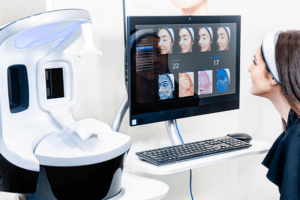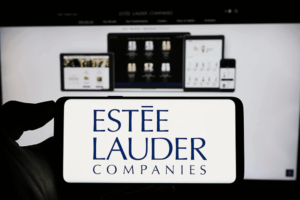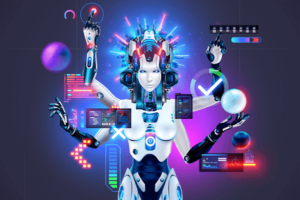How AI is Revolutionizing the Beauty Industry in 2024
In 2024, artificial intelligence (AI) is transforming the beauty and personal care landscape, enhancing customer experiences and service offerings. This shift is not just about efficiency; it’s about personalization, innovation, and a deeper understanding of consumer needs. As beauty brands integrate AI technologies, they are setting new standards for customer engagement and product development.
Virtual Try-Ons

Brands like L’Oréal and Sephora have pioneered virtual try-on technologies that allow customers to experiment with makeup in real-time through augmented reality (AR). Using facial recognition and AI algorithms, these tools enable shoppers to see how different products will look on their skin tone and facial features before making a purchase.
This personalized experience reduces the uncertainty often associated with online shopping and enhances customer confidence, leading to higher satisfaction and lower return rates. The convenience of trying products virtually encourages customers to explore new looks and increases brand loyalty.
Customized Skincare

AI-driven skincare analysis tools are making waves, with companies like Proven and Skin Ceuticals offering personalized regimens tailored to individual skin types and concerns, providing essential skincare tips for achieving your best complexion.
These tools often employ machine learning to analyze user-uploaded photos and skin data, creating highly customized skincare solutions. By considering factors like age, skin type, environmental exposure, and even lifestyle, these AI systems recommend products that meet specific needs. This level of personalization not only helps consumers achieve better skincare results but also fosters a deeper connection between brands and customers.
Smart Beauty Devices

The emergence of AI-powered beauty devices marks a significant trend in personal care. Foreo’s smart facial cleansing brushes, for example, adapt to individual skin types and cleansing needs, providing a more effective cleansing experience. Similarly, Neutrogena’s Skin360 app uses AI to analyze skin health and recommend tailored skincare routines. These devices leverage data to enhance user experience and offer real-time feedback, helping consumers maintain healthier skin while fostering brand engagement.
Data-Driven Trends

AI analytics are revolutionizing how beauty brands understand and predict consumer trends. Companies like Estée Lauder utilize data mining and machine learning algorithms to analyze vast amounts of consumer data, identifying emerging preferences and market trends.
This intelligence allows brands to tailor product offerings, marketing strategies, and promotional campaigns to align with consumer interests. By staying ahead of trends, brands can ensure they meet market demands and maintain a competitive edge, ultimately driving sales and customer loyalty.
Enhanced Customer Service

AI is also reshaping customer service in the beauty industry. Chatbots and AI assistants are now integral to many beauty brands and salons, providing immediate responses to customer inquiries and streamlining booking processes. These AI-driven solutions enhance customer interaction by offering personalized recommendations, answering questions about products, and assisting with appointment scheduling. This efficiency not only improves customer satisfaction but also frees up staff to focus on delivering high-quality services.
Conclusion
The integration of AI in the beauty industry in 2024 represents a significant shift towards personalized, data-driven experiences that cater to individual consumer needs. As these technologies continue to evolve, they not only enhance customer engagement but also position beauty brands as innovative leaders in the market. For salon, embracing AI technology can create a forward-thinking business model that attracts a tech-savvy clientele, ensuring long-term success in a rapidly changing landscape.
